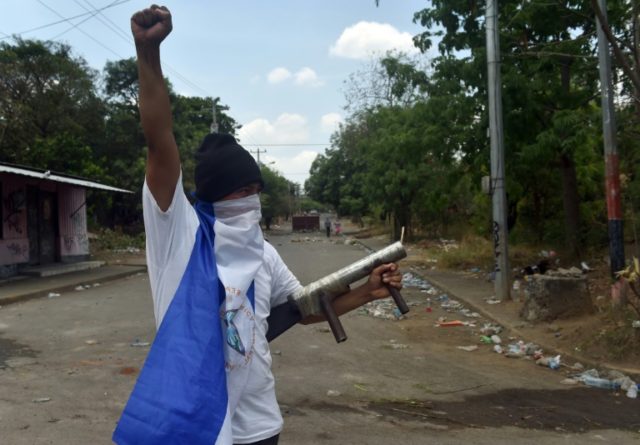Managua (AFP) – Days of clashes between protesters and security forces in Nicaragua have killed at least 24 people, a rights group said Sunday, as looting also gripped parts of the Central American country.
The unrest erupted Wednesday over pension reforms, with students a prominent group.
A robust response ordered by leftist President Daniel Ortega has seen the army deployed to the streets, independent media muzzled, journalists assaulted and pro-government demonstrators mobilized to counter the protests.
The European Union, the United States and the Vatican have expressed concern at the situation and called for calm.
The Nicaraguan Center for Human Rights told AFP that at least 24 people were killed since Wednesday, according to a toll it has compiled.
The center’s director, Vilma Nunez, warned that there was “a lot of misinformation” going around that made obtaining the figure difficult.
On Friday, the government put the number of people killed in two days of protests at 10. No more recent official toll has yet been made available.
On Saturday, a local journalist, Miguel Angel Gahona, was shot dead by a bullet in the city of Bluefields, on Nicaragua’s Caribbean coast. Some local media reports said a police sniper was suspected to be responsible.
Looting was seen at stores in Managua. In some locations, armed store owners stood guard outside their premises to stop mobs from entering.
Parts of the capital were strewn with rubble, remnants of clashes between demonstrators and riot police.
– ‘Live rounds’ –
A doctor treating those wounded in the clashes, Eyel Almanza, said in an interview that police officers were resorting to deadly force.
“The wounds suffered by students have been from firearms. Anti-riot police had been using rubber bullets, but not anymore — they are using live rounds,” he said.
Soldiers armed with rifles stood guard at public offices in Managua, as well as in the northern city of Esteli. The army said it was “providing protection to entities and strategic sites.”
Police on Thursday said one 33-year-old officer had been shot dead.
Nicabus, an international bus line with links to Costa Rica and Honduras, said it had suspended services due to the violence.
Protest groups announced a march to the Polytechnic University in the capital, where hundreds of students have been holed up since Thursday.
One male student who declined to give his name said the aim now was to see Ortega step down from office.
“We don’t want him as our president anymore. We don’t want this dictatorship,” he told AFP.
The protests are the biggest in the 11 years Ortega has been in power.
On Saturday, the president was rebuffed when he offered to speak to the private sector’s top business association about the pension reforms, which would see employee contributions increased and benefits reduced in a bid to tamp down on a climbing deficit.
The business association said there could be no dialogue unless Ortega’s government “immediately ceases police repression.”
– International alarm –
Throughout the protests, journalists have reportedly faced attacks, been temporarily detained and had their equipment stolen.
Four independent television outlets were taken off air on Thursday. By Sunday, only one remained barred.
Panicked residents in Managua and elsewhere emptied supermarket shelves and bought fuel to see through what could become a prolonged crisis.
“With this stoppage, it’s possible we could be left with nothing to eat,” said Ines Espinoza, a resident in the north of capital who walked out of a store with her two children, carrying bottles of water, biscuits and canned food.
The unexpected wave of violence in an otherwise relatively tightly controlled country has caused international alarm.
The United States denounced the “excessive force used by police and others” in Nicaragua.
A US State Department statement urged Ortega’s government to allow journalists to work freely and to engage in “a broad-based dialogue” to calm the chaos.
The European Union called the violence “unacceptable” and also demanded that news media be permitted to do their work.
“Protests need to be conducted peacefully, and public security forces must act with maximum restraint,” EU foreign policy chief Federica Mogherini said in a statement.
Pope Francis, meanwhile, used his Sunday service in St Peter’s Square in the Vatican to ask that the “pointless spilling of blood is avoided and the underlying issues be resolved peacefully and with a sense of responsibility.”
Analysts and business leaders said the protests were fueled by dissatisfaction that went well beyond anger over pension reform.
“This has not been seen for years in Nicaragua,” said Carlos Tunnermann, a former Nicaraguan ambassador to the US.
“There is a malaise of the population not only over the reforms, but for the way in which the country has been run,” he added.

COMMENTS
Please let us know if you're having issues with commenting.